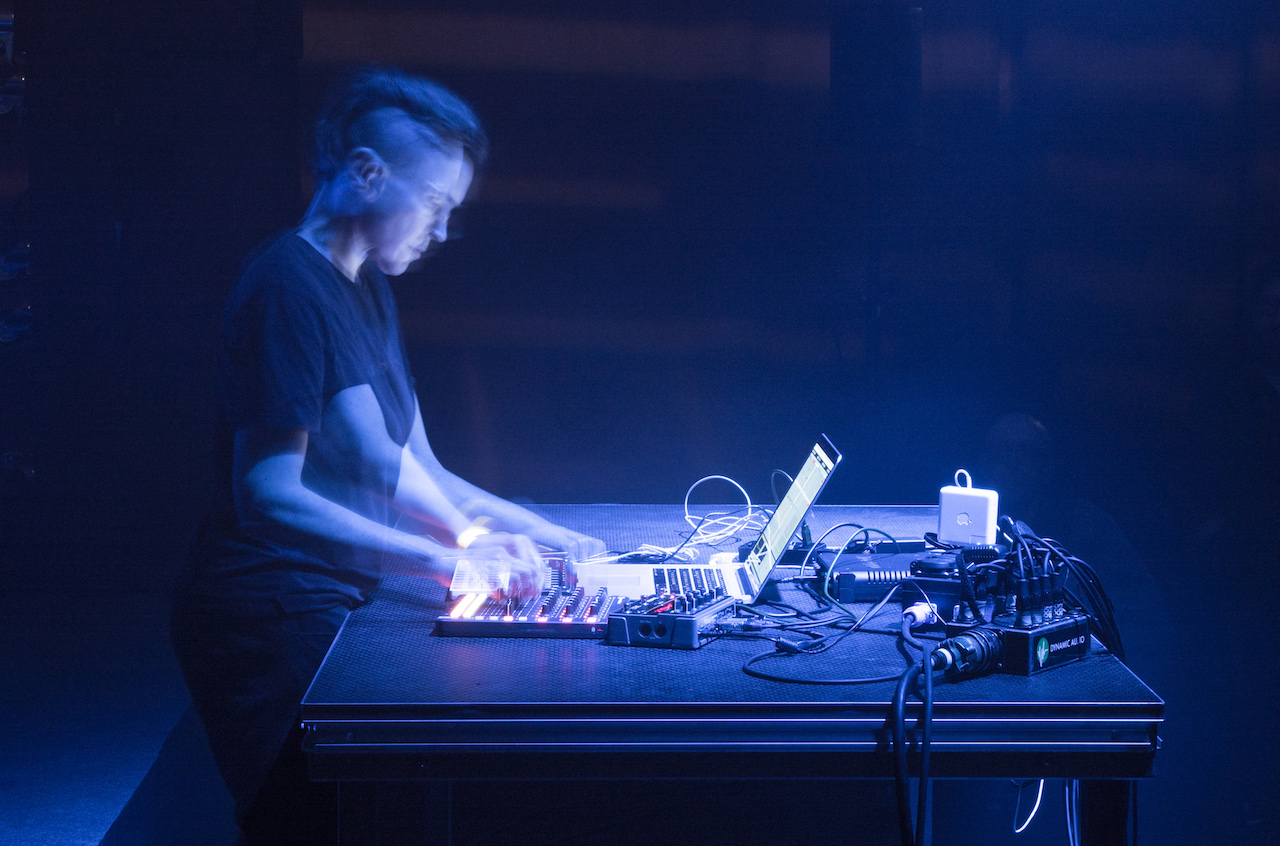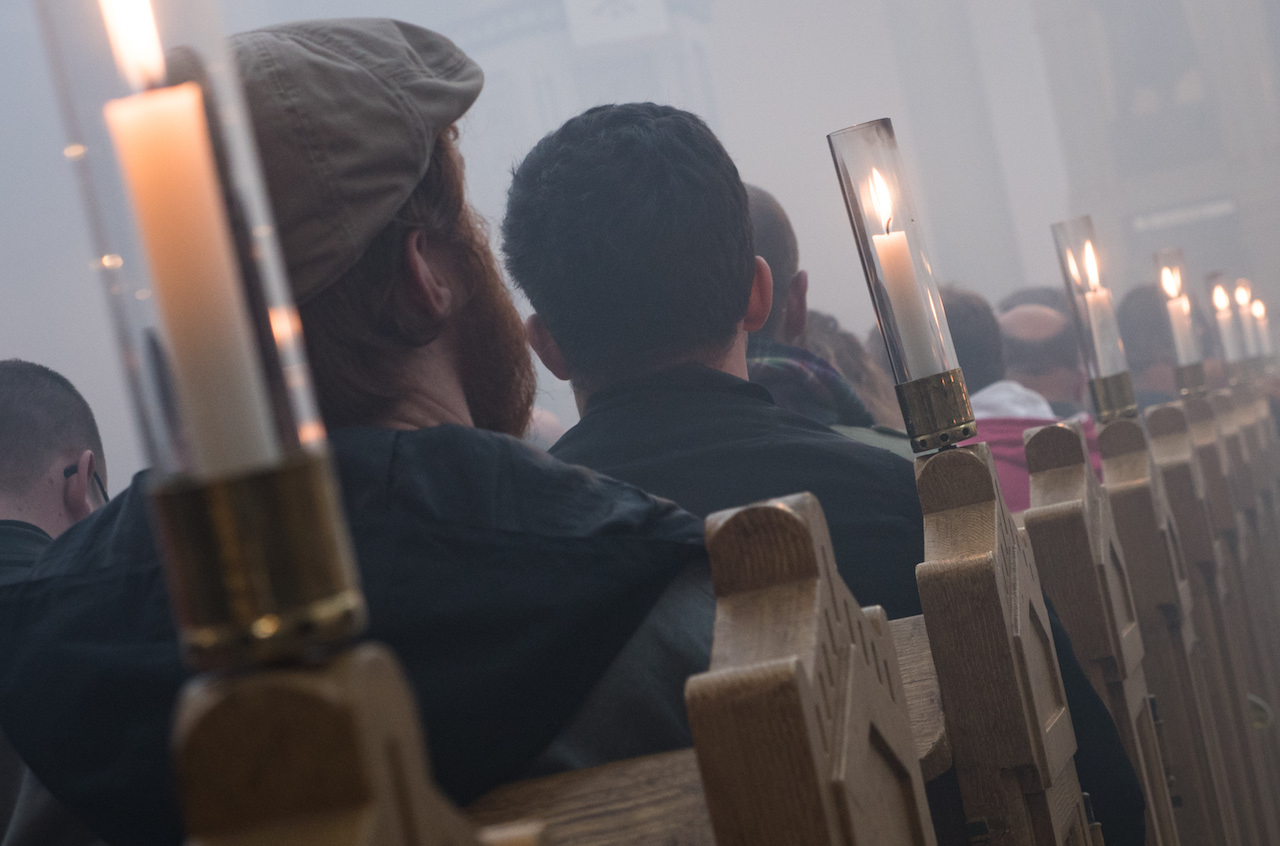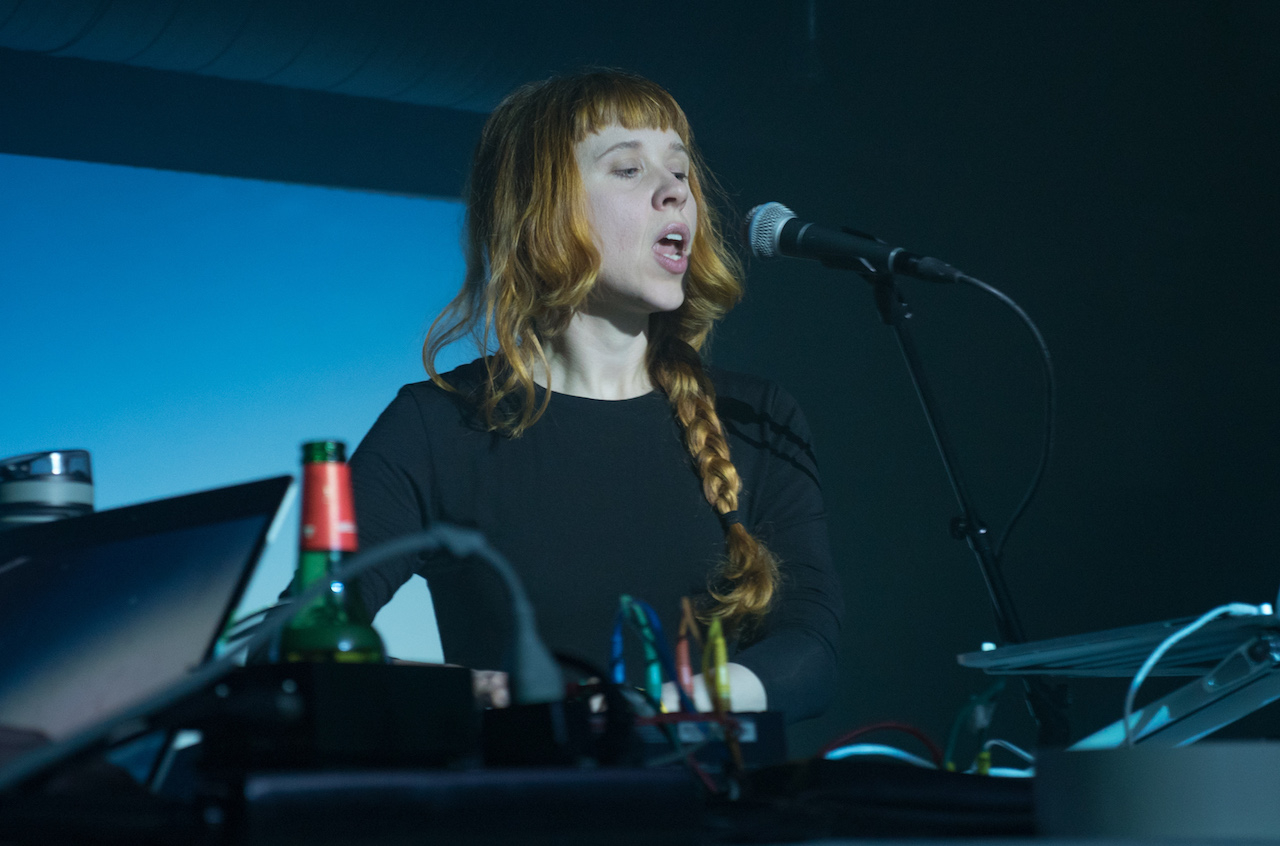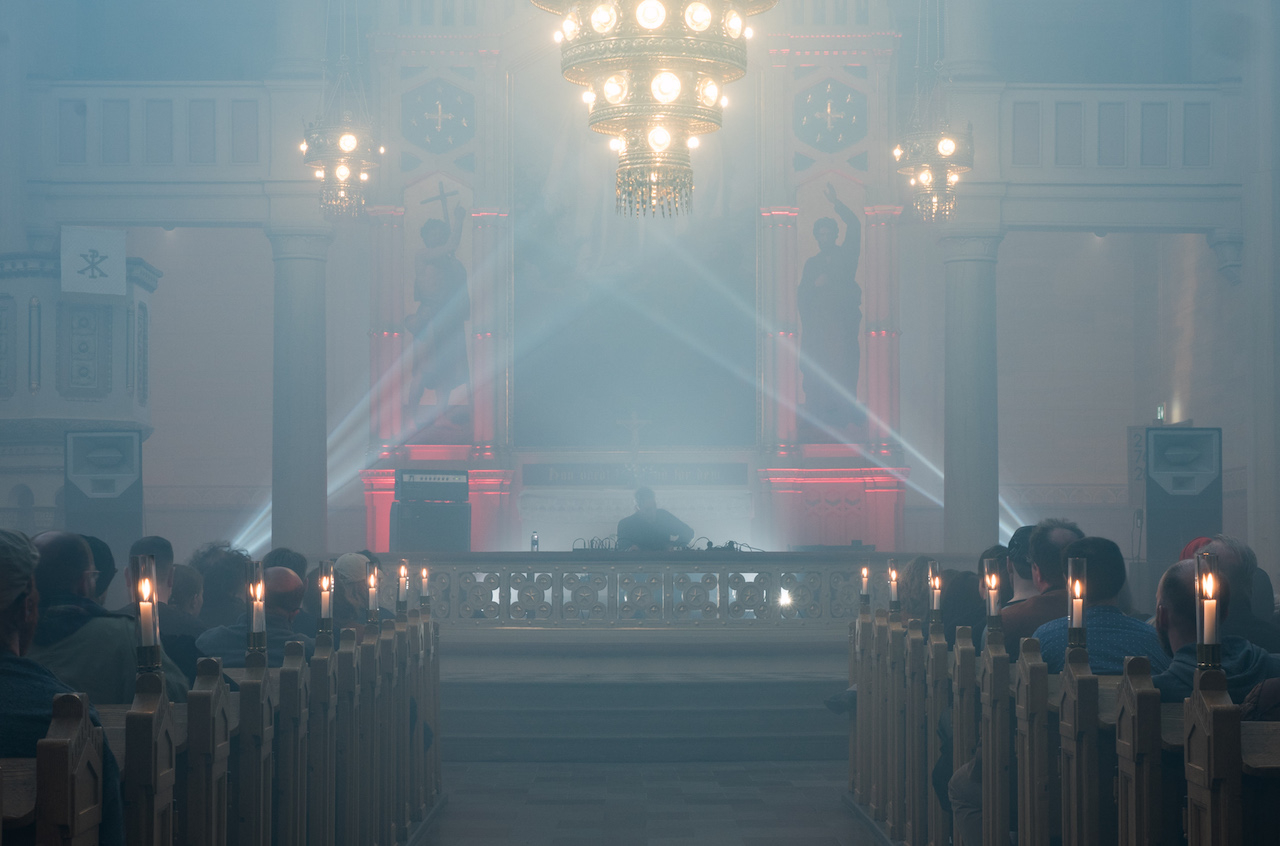- Malmö has been making international headlines this year for all the wrong reasons. It's been labeled "Sweden's Chicago" and "the most dangerous city in Europe" by the alt-right media in the US. Donald Trump and Nigel Farage referred to it in their anti-immigration tirades, while reports of local gang violence, shootings, arson and bomb threats are all over the internet. I had no idea about any of this before arriving for the third edition of Intonal Festival last weekend, and never did I feel threatened walking around on my own. The only thing that terrified me was the price of beer.
Malmö is Sweden's third largest city after Stockholm and Gothenburg, and is a far more affordable place to live than either. It's laid-back and working class, with picturesque natural spots, a dash of tourist appeal and a friendly, off-the-beaten-track charm. Students and young people roam. Though it might not be the most culturally progressive city in Sweden, it does boast a strong underground scene, with plenty of DIY initiatives and a growing interest in experimental electronic music. Intonal was set up to develop the latter, presenting a programme that you otherwise wouldn't get in the city. (Malmö is a pub and rock club kinda town). It's the brainchild of Kontra-Musik's Ulf Eriksson, who along with Emanuel Håkansson from Fasaan Recordings, put together the majority of this year's lineup. CTM and Unsound are curatorial partners, which is why, for example, Polish guitarist Raphael Rogiński and visual artist/composer Anna Zaradny were billed.
Inkonst, an international arts centre housed in an old chocolate factory, served as the main hub for the weekend. It's one of few forward-thinking club venues in Malmö—Kara-Lis Coverdale and Mark Fell just completed month-long artist residencies there, a programme run in partnership with the Inter Arts Centre (ICA) next door. Coverdale worked on an acousmonium piece, which she incorporated into her performance on Saturday. It was like the soundtrack to a dream, a fantastical kaleidoscope of mixed media recordings set to a drift. Fell produced an installation that was shown in the ICA. He'd arranged speakers into geometric shapes along with old overhead projectors, presenting something that felt at once extremely high and low brow. He also sat down with music journalist Lisa Blanning on Sunday, opening up about his practice and about Geometry Of Now, the festival he helped put together in Moscow earlier this year. (Unfortunately, though, he didn't perform.)
Intonal's music programme was roughly split between sit-down concerts, held in a space called Black Box, and clubbier events spread across other parts of the building. Electric Indigo presented her microscopic multichannel sound piece, 109.47 Degrees, in the former on Friday. Another highlight here was William Basinski, who closed the festival with two majestic reel-to-reel tape compositions from his current record, A Shadow In Time. "For David Robert Jones," which was performed first and has a mournful woodwind melody running through it, is a tribute to David Bowie, while a "A Shadow in Time" commemorates the late Chinese performance artist Deng Tai with aching, celestial drones.
Amsterdam's Red Light Radio hosted most of the DJs on Friday and Saturday in Inkonst's foyer, which turned out to be more of a lounging affair than a rave. As well as taking names from the lineup, they invited locals from neighbouring Copenhagen and Stockholm, like Troels Hastrup from Percy Records store and Käften label boss Towlie. Malmö legend Finn Of Tomland, who played three times across the weekend, also DJ'ed, though his weirdest and best performance took place on Thursday in an old water tower in Pildammsparken, a night dubbed Ambient Tower. (It was one of two free concerts put on by Intonal—the other featured Oren Ambarchi in a church.) Finn Of Tomland kept the crowd entertained with obscurities like the spoken word intro to the original 1978 BBC Radio Series of The Hitchhiker's Guide To The Galaxy. He played in enthusiastic bursts between live performances from experimental drone duo Död, Yves De Mey and dadaist multi-instrumental group Rytmiskonsekvens, who performed a haunted jam of percussion, vocals and brass in the centre of the tower. They were obscured by a veil and shrouded in darkness, aside from a few clip-on bike lights. Everyone else played in tiny alcoves drenched in pink light and fog. It made for some wonderfully uncouth beginnings.
Elsewhere on Friday, Berlin-based Moon Wheel and New Yorker Eartheater impressed with their two very different live sets. Moon Wheel bridged techno, dub and dancehall in a fresh and mercurial manner; Eartheater made a bonkers racket with her voice, an FX pedal and an electric lute-type instrument. Holly Herndon and Mat Dryhurst were the most fun on Saturday, even if they have been touring the same show for the last few years. Paula Temple, on the other hand, road-tested something brand new: a collaboration with vocalist Rachel Davies from post-rock band Esben And The Witch. The music was leaden and nihilistic—a leap away from Temple's punishing hybrid techno sets—yet full of awesome sonic power. The room, choked in more fog, was barraged by a searing strobe light.
There was only one moment during the whole weekend when all hell broke loose. At 1 AM on the opening night, Stockholm collective Drömfakulteten tore through Inkonst like a hurricane. The trio of Katja Lindeberg (HAJ300), Lois Nygren and Sissel Wincent never meant to play a gabber set—it just happened—and how thankful we were for it. The troupe slammed out the likes of Nosferatu's "When Angels Cry," "I'm A Gabber" by 3 Steps Ahead and Neophyte's "Alles Kapot" in between cantankerous spells of hard-edged techno. It was a riot—people were dancing onstage and the security were told to back off. But when Volvox played in the same spot two nights later, it became clear how ill suited it was for a party. Despite her banging acid selections and some dark electro and techno from Helena Hauff in the other room—Human Resource's "Dominator" and Keith Tucker's "We Are Detroit" included—it never properly got going.
Sweden has an extremely stringent alcohol policy and archaic anti-dancing legislation (which is on its way out but still in effect). Clubbing is pretty restrained, especially compared to what we're used to in other parts of Europe. The illegal party scene, meanwhile, is booming, especially in Malmö, and it's easy to see why: beers are crazy expensive and at 3 AM the party is over with absolutely zero wriggle room. In the face of all this, Eriksson and his crew are legitimately trying to build something. Sweden could use more events like Intonal.
Photo credit /
Andreas Torstensson
 Intonal's music programme was roughly split between sit-down concerts, held in a space called Black Box, and clubbier events spread across other parts of the building. Electric Indigo presented her microscopic multichannel sound piece, 109.47 Degrees, in the former on Friday. Another highlight here was William Basinski, who closed the festival with two majestic reel-to-reel tape compositions from his current record, A Shadow In Time. "For David Robert Jones," which was performed first and has a mournful woodwind melody running through it, is a tribute to David Bowie, while a "A Shadow in Time" commemorates the late Chinese performance artist Deng Tai with aching, celestial drones. Amsterdam's Red Light Radio hosted most of the DJs on Friday and Saturday in Inkonst's foyer, which turned out to be more of a lounging affair than a rave. As well as taking names from the lineup, they invited locals from neighbouring Copenhagen and Stockholm, like Troels Hastrup from Percy Records store and Käften label boss Towlie. Malmö legend Finn Of Tomland, who played three times across the weekend, also DJ'ed, though his weirdest and best performance took place on Thursday in an old water tower in Pildammsparken, a night dubbed Ambient Tower. (It was one of two free concerts put on by Intonal—the other featured Oren Ambarchi in a church.) Finn Of Tomland kept the crowd entertained with obscurities like the spoken word intro to the original 1978 BBC Radio Series of The Hitchhiker's Guide To The Galaxy. He played in enthusiastic bursts between live performances from experimental drone duo Död, Yves De Mey and dadaist multi-instrumental group Rytmiskonsekvens, who performed a haunted jam of percussion, vocals and brass in the centre of the tower. They were obscured by a veil and shrouded in darkness, aside from a few clip-on bike lights. Everyone else played in tiny alcoves drenched in pink light and fog. It made for some wonderfully uncouth beginnings.
Intonal's music programme was roughly split between sit-down concerts, held in a space called Black Box, and clubbier events spread across other parts of the building. Electric Indigo presented her microscopic multichannel sound piece, 109.47 Degrees, in the former on Friday. Another highlight here was William Basinski, who closed the festival with two majestic reel-to-reel tape compositions from his current record, A Shadow In Time. "For David Robert Jones," which was performed first and has a mournful woodwind melody running through it, is a tribute to David Bowie, while a "A Shadow in Time" commemorates the late Chinese performance artist Deng Tai with aching, celestial drones. Amsterdam's Red Light Radio hosted most of the DJs on Friday and Saturday in Inkonst's foyer, which turned out to be more of a lounging affair than a rave. As well as taking names from the lineup, they invited locals from neighbouring Copenhagen and Stockholm, like Troels Hastrup from Percy Records store and Käften label boss Towlie. Malmö legend Finn Of Tomland, who played three times across the weekend, also DJ'ed, though his weirdest and best performance took place on Thursday in an old water tower in Pildammsparken, a night dubbed Ambient Tower. (It was one of two free concerts put on by Intonal—the other featured Oren Ambarchi in a church.) Finn Of Tomland kept the crowd entertained with obscurities like the spoken word intro to the original 1978 BBC Radio Series of The Hitchhiker's Guide To The Galaxy. He played in enthusiastic bursts between live performances from experimental drone duo Död, Yves De Mey and dadaist multi-instrumental group Rytmiskonsekvens, who performed a haunted jam of percussion, vocals and brass in the centre of the tower. They were obscured by a veil and shrouded in darkness, aside from a few clip-on bike lights. Everyone else played in tiny alcoves drenched in pink light and fog. It made for some wonderfully uncouth beginnings.
 Elsewhere on Friday, Berlin-based Moon Wheel and New Yorker Eartheater impressed with their two very different live sets. Moon Wheel bridged techno, dub and dancehall in a fresh and mercurial manner; Eartheater made a bonkers racket with her voice, an FX pedal and an electric lute-type instrument. Holly Herndon and Mat Dryhurst were the most fun on Saturday, even if they have been touring the same show for the last few years. Paula Temple, on the other hand, road-tested something brand new: a collaboration with vocalist Rachel Davies from post-rock band Esben And The Witch. The music was leaden and nihilistic—a leap away from Temple's punishing hybrid techno sets—yet full of awesome sonic power. The room, choked in more fog, was barraged by a searing strobe light. There was only one moment during the whole weekend when all hell broke loose. At 1 AM on the opening night, Stockholm collective Drömfakulteten tore through Inkonst like a hurricane. The trio of Katja Lindeberg (HAJ300), Lois Nygren and Sissel Wincent never meant to play a gabber set—it just happened—and how thankful we were for it. The troupe slammed out the likes of Nosferatu's "When Angels Cry," "I'm A Gabber" by 3 Steps Ahead and Neophyte's "Alles Kapot" in between cantankerous spells of hard-edged techno. It was a riot—people were dancing onstage and the security were told to back off. But when Volvox played in the same spot two nights later, it became clear how ill suited it was for a party. Despite her banging acid selections and some dark electro and techno from Helena Hauff in the other room—Human Resource's "Dominator" and Keith Tucker's "We Are Detroit" included—it never properly got going. Sweden has an extremely stringent alcohol policy and archaic anti-dancing legislation (which is on its way out but still in effect). Clubbing is pretty restrained, especially compared to what we're used to in other parts of Europe. The illegal party scene, meanwhile, is booming, especially in Malmö, and it's easy to see why: beers are crazy expensive and at 3 AM the party is over with absolutely zero wriggle room. In the face of all this, Eriksson and his crew are legitimately trying to build something. Sweden could use more events like Intonal. Photo credit / Andreas Torstensson
Elsewhere on Friday, Berlin-based Moon Wheel and New Yorker Eartheater impressed with their two very different live sets. Moon Wheel bridged techno, dub and dancehall in a fresh and mercurial manner; Eartheater made a bonkers racket with her voice, an FX pedal and an electric lute-type instrument. Holly Herndon and Mat Dryhurst were the most fun on Saturday, even if they have been touring the same show for the last few years. Paula Temple, on the other hand, road-tested something brand new: a collaboration with vocalist Rachel Davies from post-rock band Esben And The Witch. The music was leaden and nihilistic—a leap away from Temple's punishing hybrid techno sets—yet full of awesome sonic power. The room, choked in more fog, was barraged by a searing strobe light. There was only one moment during the whole weekend when all hell broke loose. At 1 AM on the opening night, Stockholm collective Drömfakulteten tore through Inkonst like a hurricane. The trio of Katja Lindeberg (HAJ300), Lois Nygren and Sissel Wincent never meant to play a gabber set—it just happened—and how thankful we were for it. The troupe slammed out the likes of Nosferatu's "When Angels Cry," "I'm A Gabber" by 3 Steps Ahead and Neophyte's "Alles Kapot" in between cantankerous spells of hard-edged techno. It was a riot—people were dancing onstage and the security were told to back off. But when Volvox played in the same spot two nights later, it became clear how ill suited it was for a party. Despite her banging acid selections and some dark electro and techno from Helena Hauff in the other room—Human Resource's "Dominator" and Keith Tucker's "We Are Detroit" included—it never properly got going. Sweden has an extremely stringent alcohol policy and archaic anti-dancing legislation (which is on its way out but still in effect). Clubbing is pretty restrained, especially compared to what we're used to in other parts of Europe. The illegal party scene, meanwhile, is booming, especially in Malmö, and it's easy to see why: beers are crazy expensive and at 3 AM the party is over with absolutely zero wriggle room. In the face of all this, Eriksson and his crew are legitimately trying to build something. Sweden could use more events like Intonal. Photo credit / Andreas Torstensson